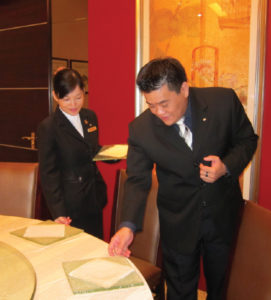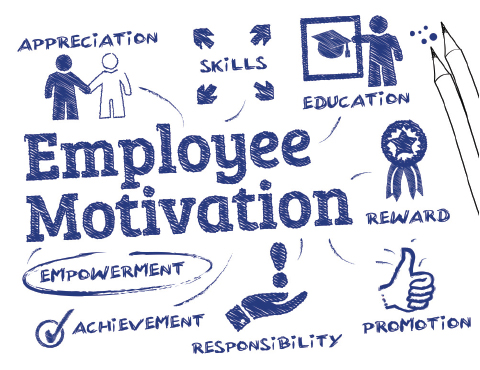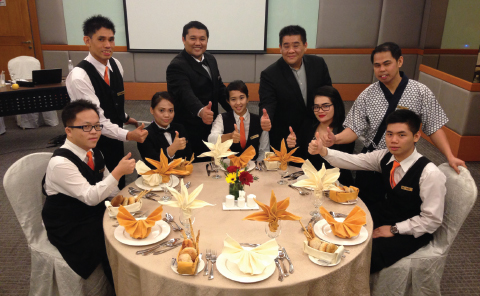 As a restaurant owner or manager in a highly competitive F&B industry, growing a successful business is most assuredly, your top priority. With a strong entrepreneurial spirit, you are motivated to work harder each day. However, the same cannot always be said about your team of staff. You are not alone.
As a restaurant owner or manager in a highly competitive F&B industry, growing a successful business is most assuredly, your top priority. With a strong entrepreneurial spirit, you are motivated to work harder each day. However, the same cannot always be said about your team of staff. You are not alone.
Many F&B managers and restaurant owners around the world face the same issue; they start out with a carefully selected team of employees, individuals with stellar backgrounds and proven track records of success. You were certain that these individuals were poised to contribute to your F&B business and take it to the next level. To their credit, your team of staff started out strong. They came into the business operation with fresh ideas and energy. But lately, this has not been the case.
Somewhere along the way, you realise that your team has begun to lose their drive. What happened to that star waitress and bartender that your customers used to praise in the first few months of work? The short answer is, they are lacking in motivation and have become complacent. Not to worry, this is an entirely fixable problem. So before you clean house (which is a bad idea), remember that there are a few simple ways that you can reignite that spark you once saw in your staff. The best way to do this is by first becoming a good leader and providing your team with effective training.
We had the pleasure of speaking to Mr Roy Cheng, a Consultant Trainer with Restaurant & Catering Academy Sdn Bhd (RECA) on how to motivate staff to work better and more efficiently. Armed with a Masters in International Hospitality Management from the University of Toulouse, France and 20 years of diverse experience in the hospitality industry under his belt, Mr Cheng generously provided us with some insightful ideas on how to maintain, motivate, and retain your restaurant staff for the long haul. Below are some of his golden tips that you can follow and adept to suit your own business’ needs.

1. PROVIDE EFFECTIVE LEADERSHIP AND SUPERVISORY SKILLS
A successful entrepreneur or manager requires ‘effective leadership skills and business acumen’ in order to drive the business to achieve its goals and objectives.
According to Mr. Cheng, “it is about guiding and influencing your staff to reach these goals and objectives. For example, a good restaurant manager or supervisor knows how to train and supervise employees by observing their work to ensure that it meets the expectations or standards and to offer guidance and support to them. This same manager/ supervisor should also lead the team during busy meal periods and provide leadership by example i.e. showing care and concern for guests, checking on guests’ satisfaction and anticipating the needs of guests.”


2. MANAGE EMPLOYEES’ PERFORMANCE
There are 6 steps that a restaurant owner or manager can practice in order to manage an employee’s performance:
I. Expectation. It is extremely important for employees to know what is expected of them when they begin working at your restaurant. This can be listed in their job description advertisement, through an Employee’s Handbook, or Standard Operating Procedures (SOP) and Performance guidelines.
II. Training. Employees need to be trained on how to perform the tasks according to the SOP.
III. Coaching. Employees then need to be coached in order to reinforce back the job expectation.
IV. Feedback. Regular feedback must be given to employees on their job performance, in addition to corrective coaching.
V. On-going communication. Provide employees with ongoing communication about expectations, standards or priorities through daily briefing, meetings, etc.
VI. Reward. The performance of employees should be linked to rewards. For example, reward the performance of a good employee through bonuses or increment at the year-end.


3. RECOGNIZE GOOD WORK
Restaurant owners or managers who recognise their employees’ work tend to have a more highly motivated team of staff that deliver better results. This, in turn, makes the restaurant more successful with happy and returning guests. The sad truth is many leaders fail to recognize a job well done as they believe that that is what their employees are paid for to do in the first place.
The good news is, recognition for the most part, is essentially free. It can take the form of a formalized program or a thoughtful email, or better still, a handwritten note. One great idea to recognise an employee for a job well done is by creating a monthly award program or employee of the month. The first step is to have all employees in the company vote for one employee who has shown the most work ethic, grit, or attitude from the previous month. You can use this to reinforce certain core values in your company by rewarding the person who shows the most of that particular value or values. Then, reward the winner with a gift card, lunch, or even a creative trophy or certificate.

4. FOCUS MORE ON INTRINSIC AWARDS (VALUE, PURPOSE) IN ADDITION TO EXTRINSIC AWARDS (MONEY, REWARDS)
Motivating your staff begins with one question – is this a job or career to them? Promoting a career mind-set will give your staff a ‘purpose’ in life and the ability to provide them with ‘personal growth motivation’ i.e. changing the way your employees view their job. Instead of having the ‘just another day another dollar’ attitude, you can help them in their learning & development, and become more capable, thus giving them a meaningful purpose in coming to work.
To put this intrinsic motivation into play in your workplace, try things like rallying workers around certain core values. The first step in this process is creating core values that express the essence of why your company exists. Ask a question like who does your business serve, what problems are you solving, and what are the norms and behaviours that drive your team’s approach, among others. Then, the next step in this process is to make these values highly visible, and even go so far as to ingrain them into your company culture through things such as quizzes and awards.
Intrinsic awards should be focused towards talented employees and on a longer term basis whereas an extrinsic award (which is a short-term reward) should be given for immediate results and across every employee.
5. PRACTICE TRANSPARENCY
Many F&B businesses do not practice business transparency. Of course, certain figures e.g. rental, interests earned, or depreciation can be hidden but there is no reason not to share your operational figures and profit and loss statement with your team internally. Resist the urge to sugar-coat and spin bad numbers.
Sharing your restaurant’s business performance with your employees will encourage an entrepreneurial mind-set and thus help them to better understand the business and their role and contribution to it. Your staff will feel more motivated to work hard when they understand how their daily work adds value to the business (e.g. doing suggestive selling
and up-selling to achieve the sales target or cost saving measures to improve on profitability). This will also provide direction, clear objectives and targets (e.g. achieving the KPI in managing business performance).

6. PRIORITISE WORK-LIFE BALANCE
The F&B business is competitive with erratic or long working hours and can be highly stressful. Because of this, it is important for F&B business owners and managers to incorporate a work-life balance for staff. This is the right way forward in order to attract the younger generation (Gen Y & Gen Z) to build a career in F&B. Employers and managers should start by paying the right salary and offer compensation and benefits (i.e. benchmark with other industries to make it more attractive). It is also important that there is a change in mind-set in both the employer and employee – higher salary comes with higher productivity level (i.e. running the restaurant with lesser manpower – less men more share and more men less share).
Leverage on technology to assist in promoting a work-life balance atmosphere. Changes can be made to the way the business is operated (e.g. using technologies, robotics, AI) or even re-visiting work processes to simplify it.

7. OFFER A CLEAR PATH FOR ADVANCEMENT
Implement individual development plans which have three personal and three professional goals, with short- and long-term targets. Next, identify where they are and what they need in order to achieve these goals. Hold monthly meetings to keep your employees accountable.
8. LET THEM KNOW YOU TRUST THEM
It is important to let your employee know you trust and depend on them. A vote of confidence can go a long way as this will help them fill those shoes sooner than you think. Knowing that you trust them to do the best job possible, they will rarely disappoint you. Go on and try it.
9. LET THEM LEAD
Show your team that they make a difference and are valued by giving them an opportunity to lead. For example, at every staff meeting, whether large or small, allow a different staff to lead the conversation and the topics discussed. This way, not only can they share their opinions and be heard, but they will also become more motivated to make their thoughts and ideas happen afterwards.
10. DON’T PIT EMPLOYEES AGAINST ONE ANOTHER
To avoid this from occurring, try to create a culture of celebrating success as a team. Rather than focusing on one or two individuals who drive outcomes, focus also on the support roles that others play to make this success happen.
11. REMEMBER YOUR PAST EXPERIENCES
You may have once been an employee too. So try this exercise – think back to the worst manager that you have ever had and list down all the things that he/she has done wrong as a manager. Now, do the opposite for your favourite manager. Then, identify both the traits you liked and did not like, in yourself this time. Now, cut out the bad and improve on the good ones.

12. HAVE AN OPEN-DOOR POLICY
Practice an open-door policy with your staff so that they will feel free to come to you with suggestions and ideas. When your staff feels that their voice matters, they will become more confident about their positions within the business operations as well as feel that they have more at stake than just a paycheck.
The team of staff running around and serving your customers is the most essential aspect in the running of a successful business. Mr Cheng reminds F&B owners and managers that “the happier the team of staff is at work, the more efficient the business flow will be – it is as simple as that. However, it is important to remember that in order for your staff to be good at what they do, they have to be motivated, engaged, productive and effective at work. While the above tips to keep your team motivated may not be a ‘one-size-fits-all’ solution, take some of the ideas mentioned above and see how you can adept them to fit your business. By paying close attention to the needs of your staff, you will surely win with motivated, excited, contributing employees once again”.
 MR ROY CHENG YEW CHUAN,
MR ROY CHENG YEW CHUAN,
Managing Consultant atRestaurant and Catering Academy Sdn. Bhd. (RECA) and Certified Hospitality Trainer.
Email: roycheng.ihr@gmail.com










